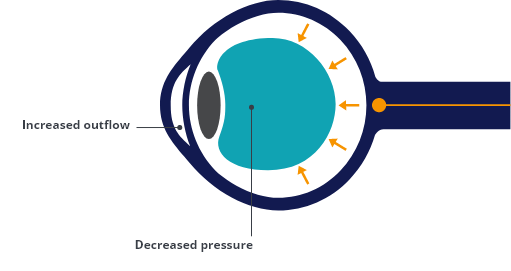- About VYZULTA®
- Warnings and Precautions
- Possible side effects
What is VYZULTA®?
VYZULTA® is used to reduce the high pressure in the eye in patients
with open-angle glaucoma or ocular hypertension.

How does VYZULTA® work?
VYZULTA® lowers the pressure in the eye by increasing the outflow of fluid from
inside the eye.
- About VYZULTA®
- Warnings and Precautions
- Possible side effects
Warnings and precautions
Do not use VYZULTA® if you:
- are allergic to latanoprostene bunod (the medicinal ingredient in VYZULTA®)
- are allergic to any of the other ingredients in VYZULTA® or to a component of the container
To help avoid side effects and ensure proper use, talk to your healthcare professional before you take VYZULTA®. Talk about any health conditions or problems you may have, including if you:
- have or have had eye inflammation including the conditions iritis or uveitis
- have or have had a torn posterior lens capsule
- have or have had eye swelling including a condition called macular edema
- have or have had a viral infection of the eye called herpes keratitis
- have severe asthma or asthma that is not controlled
- are using any other eye drops
- notice any changes in your eyelashes or colour of your eyes
- wear contact lenses
- are pregnant or planning to become pregnant
- are breastfeeding or planning to breastfeed
Other warnings you should know about:
- Driving and using machines
- – Wait until you can see clearly before driving or operating machines after applying VYZULTA®
- Tell your healthcare professional about all the medicines you take, including any drugs, vitamins, minerals, natural supplements or alternative medicines
- About VYZULTA®
- Warnings and Precautions
- Possible side effects
Possible Side Effects
Common side effects
- eye irritation
- eye redness
- eye pain
- pain in your eye at the application site
- runny or stuffed nose, sore throat
Rare side effects
- altered sense of taste
- feeling of grittiness or having something in the eye
Other side effects
- VYZULTA® may change colour of your eye or eyelid. The eye colour change may not be noticeable for many months to years. The eye colour and eyelid changes may be permanent. Tell your doctor if your eye colour has changed. They may examine your eyes more often.
- VYZULTA® may also cause your eyelashes to appear thicker and longer than they usually do and increase in number. Eyelash changes are reversible after treatment with VYZULTA® is stopped.
Serious side effects and what to do about them
Talk to your healthcare professional in all cases if you develop the following rare side effects:
- Bacterial keratitis (infection of the eye): eye pain or redness, decreased vision, discharge from the eye, sensitivity of the eye to light, swelling of the eye or eyelid, watery eyes or production of tears
- Macular edema (swelling and buildup of fluid in the center of the retina): blurry vision, blurry or wavy vision near or in the center of your field of vision, colours may appear washed out or faded
These are not all the possible side effects that you may feel when taking VYZULTA®. If you experience any side effects not listed here, contact your healthcare professional.